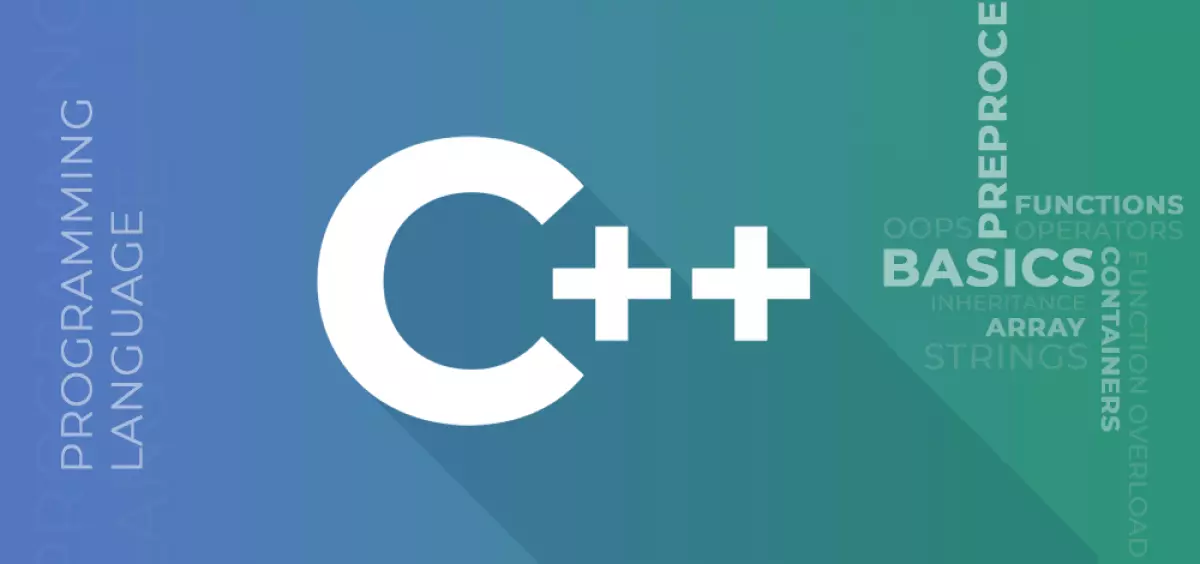
Introduction
C++ is a high-level, object-oriented programming language developed by Bjarne Stroustrup. It is widely used for software development, game development, and operating system programming. With its clean and efficient code, C++ is suitable for large-scale applications. This tutorial covers all the basic and advanced topics of C++, including C++ basics, functions, classes, and STL concepts.
What is C++?
C++ is a popular cross-platform programming language used to create high-performance applications such as operating systems, games, and e-commerce software. Developed as an extension of the C language, C++ offers a high level of control over system resources and memory.
Why Learn C++?
There are several reasons why learning C++ is beneficial:
- C++ is one of the most widely used and popular programming languages.
- It is used in operating systems, embedded systems, and graphical user interfaces.
- C++ follows object-oriented programming principles, providing structure and code reuse.
- It is portable and adaptable to multiple platforms.
- C++ is easy to learn, making it a great choice for beginners.
- The syntax of C++ is similar to C, Java, and C#, making it easier for programmers to switch between languages.
C++ Tutorial - Table of Contents
-
C++ Overview
- Introduction to C++
- Features of C++
- History of C++
- Interesting Facts about C++
- Setting up C++ Development Environment
- Similarities and Differences between C++ and C
-
C++ Basics
- First C++ Program
- C++ Basic Syntax
- C++ Comments
- C++ Tokens
- C++ Identifiers
- C++ Keywords
- Difference between Keyword and Identifier
-
C++ Variables and Constants
- C++ Variables
- C++ Constants
- Scope of C++ Variables
- C++ Storage Classes
- C++ Static Variables
-
C++ Data Types and Literals
- C++ Data Types
- C++ Literals
- C++ Derived Data Types
- C++ User-Defined Data Types
- C++ Data Type Ranges and Their Macros
- C++ Type Modifiers
- C++ Data Type Conversion
- C++ Typecasting Operators
-
C++ Operators
- C++ Operators
- C++ Arithmetic Operators
- C++ Unary Operators
- C++ Bitwise Operators
- C++ Relational Operators
- C++ Logical Operators
- C++ Assignment Operators
- C++ Ternary/Conditional Operators
- C++ Sizeof Operator
- C++ Scope Resolution Operator
-
C++ Input/Output
- C++ Basic Input/Output
- C++ Standard Input Stream (cin)
- C++ Standard Output Stream (cout)
- C++ Standard Error Stream (cerr)
- C++ Input/Output Manipulator
-
C++ Control Statements
- C++ Decision Making
- C++ if Statement
- C++ if-else Statement
- C++ if-else-if Ladder
- C++ Nested if-else Statement
- C++ Switch Statement
- C++ Jump Statements
- C++ Loops
- C++ for Loop
- C++ Range-Based for Loop
- C++ while Loop
- C++ do...while Loop
-
C++ Functions
- C++ Functions
- C++ return
- C++ Parameter Passing Techniques
- Difference between Call by Value and Call by Reference
- C++ Default Arguments
- C++ Recursion
- C++ Inline Functions
- C++ Lambda Expression
-
C++ Pointers and References
- C++ Pointers and References
- C++ Pointers
- C++ Pointer Arithmetic
- Dangling, Void, Null, and Wild Pointers
- Applications of Pointers
- C++ nullptr
- C++ References
- Can references refer to an invalid location in C++?
- Difference Between Pointers and References in C++
- Passing by pointer Vs Passing by Reference in C++
- When do we pass arguments by reference or pointer?
-
C++ Arrays
- C++ Arrays
- C++ Multidimensional Arrays
- C++ Pointer to an Array
- Size of Array parameter
- Passing Arrays to Functions in C++
- What is Array Decay in C++? How can it be prevented?
-
C++ Strings
- C++ Strings
- C++ std::string Class
- C++ Array of Strings
- C++ String Functions
- C++ String Concatenation
- Tokenizing a String in C++
- C++ Substring
-
C++ Structures and Unions
- C++ Structures, Unions, and Enumerations
- C++ Structures
- C++ Pointer to Structure
- C++ Self-Referential Structures
- Difference Between C Structures and C++ Structures
- C++ Unions
- C++ Bit Fields
- C++ Enumeration
- C++ typedef
- Array of Structures Vs Array within a Structure in C/C++
-
C++ Dynamic Memory Management
- C++ Dynamic Memory Management
- C++ new and delete Operators
- new vs malloc() and free() vs delete in C++
- Memory Leak in C++
- Difference between Static and Dynamic Memory Allocation in C++
-
C++ Object-Oriented Programming
- C++ Object-Oriented Programming (OOPs)
- C++ Classes and Objects
- C++ Access Modifiers
- C++ Friend Class and Function
- C++ Constructors
- C++ Default Constructors
- C++ Copy Constructor
- C++ Destructors
- C++ Private Destructor
- When is the Copy Constructor Called?
- Shallow Copy and Deep Copy in C++
- When Should We Write Our Own Copy Constructor?
- Does the Compiler Create a Default Constructor When We Write Our Own?
- C++ Static Data Members
- C++ Static Member Functions
- C++ this Pointer
- C++ Scope Resolution Operator vs this Pointer
- C++ Local Class
- C++ Nested Classes
- C++ enum Class
- Difference between Structure and Class in C++
- Why C++ is a Partially Object-Oriented Language?
-
C++ Encapsulation and Abstraction
- C++ Encapsulation
- C++ Abstraction
- Difference between Abstraction and Encapsulation in C++
-
C++ Polymorphism
- C++ Polymorphism
- C++ Function Overriding
- C++ Virtual Functions and Runtime Polymorphism
- Difference between Compile-time and Run-time Polymorphism in C++
- Difference between Inheritance and Polymorphism in C++
-
C++ Function Overloading
- C++ Function Overloading
- C++ Constructor Overloading
- C++ Functions that Cannot be Overloaded
- C++ Function Overloading and const Keyword
- C++ Function Overloading and Return Type
- C++ Function Overloading and float Data Type
- C++ Function Overloading and Default Arguments
- Can main() be overloaded?
- C++ Function Overloading Vs Function Overriding
- Advantages and Disadvantages of C++ Function Overloading
-
C++ Operator Overloading
- C++ Operator Overloading
- Types of C++ Operator Overloading
- C++ Functors
- C++ Operators that Cannot be Overloaded
-
C++ Inheritance
- C++ Inheritance
- C++ Inheritance Access
- C++ Multiple Inheritance
- C++ Hierarchical Inheritance
- C++ Multilevel Inheritance
- C++ Constructor in Multiple Inheritance
- C++ Inheritance and Friendship
- Does Function Overloading Work with Inheritance in C++?
- Difference Between Inheritance and Polymorphism in C++
-
C++ Virtual Functions
- C++ Virtual Functions
- C++ Virtual Functions in Derived Classes
- C++ Default Arguments and Virtual Function
- C++ Inline Virtual Functions
- C++ Virtual Destructor
- C++ Virtual Constructor
- C++ Virtual Copy Constructor
- C++ Pure Virtual Functions and Abstract Class
- C++ Pure Virtual Destructor in C++
- Can Static Functions be Virtual in C++?
- C++ RTTI (Run-Time Type Information)
- Can C++ Virtual Functions be Private?
-
C++ Exception Handling
- C++ Exception Handling
- C++ Exception Handling using Classes
- C++ Stack Unwinding
- C++ User-Defined Exceptions
-
C++ Files and Streams
- C++ Files and Streams
- C++ I/O Redirection
-
C++ Templates
- C++ Templates
- C++ Template Specialization
- C++ using Keyword
-
C++ Standard Template Library (STL)
- The C++ Standard Template Library (STL)
- STL Algorithms
- STL Containers
- STL Vector
- STL Pair
- STL Set
- STL Multiset
- STL Stack
- STL Queue
- STL Priority Queue
- STL Deque
- STL List
- STL Forward List
- STL Map
- STL Multimap
- STL Bitset
- STL Unordered Sets
- STL Unordered Multiset
- STL Unordered Map
- STL Unordered Multimap
-
C++ Iterators
- Introduction to C++ Iterators
- C++ Input Iterators
- C++ Output Iterators
- C++ Forward Iterators
- C++ Bidirectional Iterators
- C++ Random Access Iterators
- C++ istream_iterator and ostream Iterator
- Difference between C++ Iterators and Pointers
-
C++ Preprocessors
- C++ Preprocessor
- C++ Preprocessor Directives
- C++ #include Directive
- C++ #define Directive
- C++ Conditional Preprocessors
- Difference between C++ Preprocessor Directives and Function Templates
-
C++ Namespace
- C++ Namespaces
- Extending C++ Namespace and Unnamed Namespace
- Accessing, Creating Header, Nesting, and Aliasing Namespace
- C++ Inline Namespaces
Applications of C++
Here are some real-world applications of C++:
Operating Systems
C++ is extensively used in developing operating systems. Major parts of Mac OS X and Microsoft's software, such as Windows and Office, are written in C++.
Games
C++ is the go-to language for game development. It allows developers to create complex 3D games, multiplayer games, and more. Popular game engines like Unreal Engine are built using C++.
Web Browsers
Many web browsers, including Mozilla Firefox and Google Chrome, are developed using C++. C++ provides the necessary speed and efficiency required for browser development.
Compilers
Compilers for various programming languages, including C and C++, are built using C++. Its low-level nature allows for efficient compilation and optimization.
Embedded Systems
C++ is widely used in embedded systems development, such as smartwatches and medical equipment. Its ability to manipulate system resources makes it ideal for low-level programming.
FAQs on C++
What is the difference between C++ and C?
C++ is an extension of the C programming language. While both languages share similarities, C++ introduces object-oriented programming concepts and additional features.
C++ offers more control over system resources, supports classes and objects, and provides features like inheritance and polymorphism. On the other hand, C is more procedural and lacks these object-oriented features.
What are the differences and similarities between C++ and Java?
C++ and Java are both object-oriented programming languages, but they have some differences:
- Inheritance: C++ supports multiple inheritance, while Java supports single inheritance.
- Memory Management: C++ requires manual memory management, while Java has automatic garbage collection.
- Exception Handling: C++ uses try-catch blocks for exception handling, while Java has built-in exception handling mechanisms.
- Performance: C++ is typically faster than Java due to its closer-to-hardware nature.
- Templates vs Generics: C++ uses templates for generic programming, while Java uses generics.
Despite these differences, both languages are widely used and have large communities of developers.
Can C++ be used for competitive programming?
C++ is a popular choice for competitive programming due to its efficiency and flexibility. It offers features like fast I/O, STL algorithms and data structures, and a wide range of libraries. Learning C++ for competitive programming can give you an edge in solving complex problems efficiently.
Stay tuned for more articles on C++ and explore the vast possibilities of this versatile programming language!
Recent Articles on C++ | C++ Programs | C++ Interview Questions













